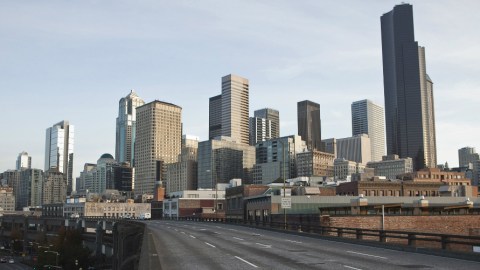Seattle Has an Ambitious Plan For Overhauling City Streets

Here’s something I didn’t know before today, via Grist‘s Greg Hanscom:
“According to TomTom, a company that makes GPS devices, [Seattle] has the fourth worst traffic in the country, worse than New York, Miami, and Washington, D.C.”
Slots 1-3 are filled by Los Angeles, San Francisco, and Honolulu. I understand those three. L.A. is L.A.; the latter two are densely-populated commuter hubs. As for the other three mentioned above — NYC, Miami, and D.C. — those are all cities notorious for their gridlock and, especially in the case of Miami, their objectively terrible drivers.
Hanscom explains that Seattle’s traffic woes are largely a matter of geography. The city is flanked on its two long sides by large bodies of water:

If you’re a commuter, getting into the city requires use of one of the major north-south thoroughfares or crossing via east-west bridge or ferry. If one or two of those entryways gets clogged due to, say, a massive fish-related disaster, car commuters are going to be listening to a whole lot of Nirvana on repeat as they just sit there. Not moving. For hours.
The major solution to Emerald City gridlock is supposed to arrive in the coming decade as the local light rail gets expanded, though Seattleites may have to wait until 2030 to enjoy the full fruits of this project.
What’s needed now is a stopgap solution, and that’s what the aforementioned Mr. Hanscom makes the focus of his piece at Grist:
“The Seattle Department of Transportation (SDOT) has laid out an ambitious plan to overhaul the city’s streets. The plan, called Move Seattle, is remarkable in many ways, but none more than this: While it includes maintenance and repair of existing roads, and upgrading bridges to make them earthquake-safe, there are virtually no new accommodations for cars. Instead, it is a plan to more efficiently move people around the city by bus, transit, bike, and on foot.”
Smart growth wonks across the country probably want a cigarette after reading that paragraph. Hanscom runs through the various facets of the plan: multimodal travel corridors, easier bus access, 50 miles of protected bike lanes, and speed limit reductions to reduce traffic deaths:
“This may sound basic, but the suggestion that cars are not the first and best use for every street, while other uses are to be shoehorned in where it’s convenient, is something of a revelation here, as it would be in many American cities.”
I recommend running through Hanscom’s full piece (it’s incredibly in-depth) for all the intricate details, as well as a thorough analysis of Move Seattle’s biggest obstacle: the roller-coaster ride of the bureaucratic and legislative processes. There’s also the price tag: $3 billion over nine years, an amount that would have to be raised by way of a tax increase. That’s never an easy sell, especially when accusations fly about a war on cars.
Hanscom quotes a SDOT employee who calls the plan “pragmatic.” The reason there are no plans that involve expanding automobile infrastructure is that there is no more room for automobile infrastructure. It’s also evident that SDOT is betting on progress for the light rail, a project Hanscom isn’t 100 percent confident will come to fruition, as it requires regional approval instead of just city approval.
What’s certain is that Seattle is behind on transportation. For a city that prides itself on progressive values, it’s got a long way to go until its streets reflect its civic vision. And if Move Seattle somehow does pass its many hurdles, it’ll be fascinating to see how the rest of the country responds to the Emerald City’s bold new transportation plan.
Read more at Grist.
Below, Ryan Chin talks electric cars and city planning:
(Photo by Stephen Brashear/Getty Images)





